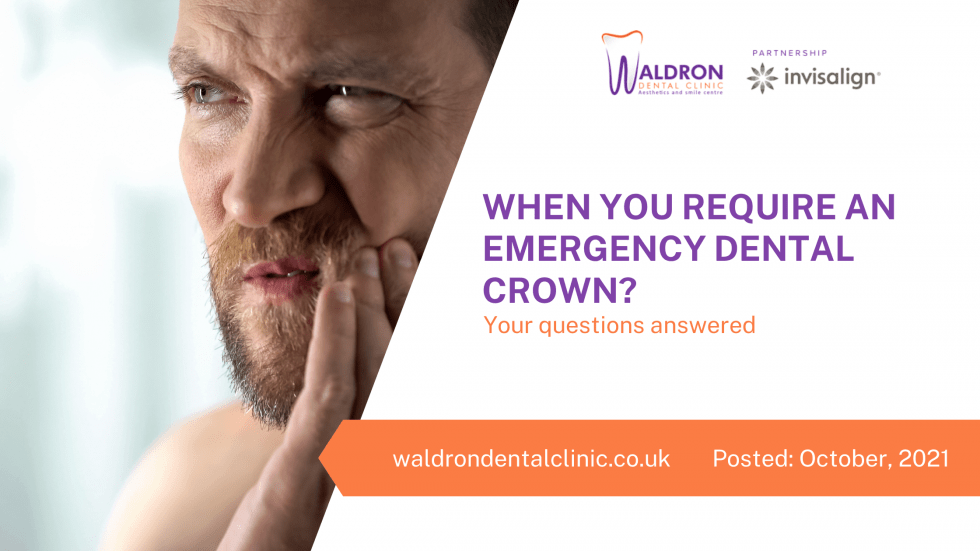Imagine this scenario; On a Saturday night, you are reading a book while comfortably sitting on a sofa, and suddenly a tooth crown comes off. You try to insert it back but to no avail. Next, you think of going to the dentist, but you realise it is a weekend and the dentist’s office will be closed. So, what should you do in this case? This is where emergency dentistry comes in! This article discusses various dental emergencies and what measures must be taken in case of an emergency. Read on to find out more.
Need an emergency dental crown? Visit Waldron Dental at our convenient locations in Biggin Hill, New Cross, or Wallington for immediate care. Contact us now to schedule your emergency appointment and restore your smile quickly.
What Qualifies As Emergency Dental Care?
According to the National Health Service, any situation that requires immediate dental or medical intervention – resulting from accidental trauma or severe infection – to prevent long-term oral health or medical conditions constitutes a dental emergency.
What Are The Common Dental Emergencies?
In general, any life-threatening situation that may cause long-term dental or medical complications is an emergency. Some of the common situations that should be considered as dental emergencies include:
- Uncontrolled bleeding
- Severe toothache which is not relieved through pain medication
- Excessive swelling, particularly if it causes difficult breathing
- Dental abscess or an infection requiring root canal treatment
- Dislodged filling or crown
- Dislodged dental bridge
- Chipped off or fractured tooth
- Something stuck between the teeth that are causing pain
- Loose implant
Are Dental Crowns Painful?
Dental crown placement is a straightforward procedure that does not cause any pain or discomfort. This is because your dentist will only remove a thin layer of the natural tooth structure to make room for the crowns. Hence, sufficient enamel tissue will remain on the tooth to prevent pain during tooth preparation. If your dentist anticipates that you may feel pain during the procedure, they will administer local anaesthesia to make you comfortable. So, you don’t have to worry; getting dental crowns is not a painful procedure.
Why Is My Dental Crown Irritating Me?
Dentists prepare crowns in such a way that they do not feel “higher” than your other teeth. However, if a crown has not been planned or fabricated properly, it may not sit well on the prepared teeth and could irritate. Besides, if any sharp edges protrude from a crown – due to fracture or time-dependent wear – it may also cause tissue irritation. Another reason for irritation is the “leaching” of the metal ions beneath the porcelain layer of the crown due to excessive wear.
Why Do I Have Tooth Pain After Getting A Crown?
Under normal circumstances, there should be no pain after getting your crowns. While short-term discomfort is nothing to worry about, persistent pain in the crowned teeth is a cause for concern. The pain may be caused by an ill-fitting crown or tooth sensitivity caused by excessive healthy tooth removal. In any case, you should visit your dentist immediately for further treatment.
How Do Dentists Remove Crowns?
Dentists attach crowns to the prepared teeth using adhesives. That is why it is not possible to remove them by ourselves. On the other hand, dentists have special instruments which allow them to get a crown replaced or repaired.
Can A Crown Be Put On A Tooth Break At The Gum Line?
Any tooth that is fractured or broken at the gumline is generally very difficult to restore. This is because sufficient remaining tooth structure must be available for dentists to “rebuild” the broken off part of the tooth. When a fracture extends beyond the gum line, there is insufficient tooth structure available to support the restorative material and subsequent crown attachment, and such a restoration is bound to fail. In such cases, dentists recommend extracting the tooth and replacing it with an implant.
Will A Dentist Charge You For Resetting A Crown That’s Fallen Out?
If a crown has fallen off because of adhesive failure, your dentist may not charge you for resetting. However, if the crown dislodgement occurred due to a tooth fracture, your dentist will have to restore the tooth first and then reattach the crown. In this case, you might be charged a fee for the procedure.
Should Dentists Use Pain Relief On Gums While Fitting A Crown?
In some cases, dentists prepare the lower borders of the crown that extend below the gumline – for aesthetic reasons – your dentist may apply a topic anaesthetic agent over the gums. This is to avoid pain and gum irritation during the tooth preparation and fitting of the crown.
Where Do I Get Emergency Dental Care Services?
During business hours, you can simply walk into your dentist’s office or book an emergency appointment. Alternatively, you may walk into any dentist office or hospital for emergency treatment if you are not in town. On the other hand, there are several ways to seek emergency medical or dental care outside business hours. First, most dental offices have emergency hotline numbers for patients to contact out of business hours. Secondly, some dentist offices also offer 24-hour emergency services, even during weekends. If no dentist offices are open nearby, you should look for an ER room in your vicinity.
Dental emergencies can happen anywhere, anytime. The most important thing is to ensure that you seek immediate treatment when in an emergency. If you have a dental emergency in New Cross, you should visit Waldron Dental Clinic right away – and we will make sure to relieve your pain in less than 24 hours. You can also book a free consultation appointment with us to seek advice on dental problems and their solutions.













